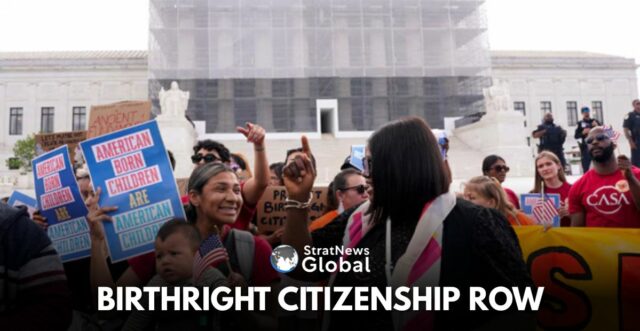A federal judge on Thursday once again blocked the Trump administration from denying citizenship to certain babies born in the U.S., using a legal exception to bypass the U.S. Supreme Court’s recent ruling that limits judges’ power to issue nationwide injunctions against such policies.
U.S. District Judge Joseph Laplante ruled at a hearing in Concord, New Hampshire, after immigrant rights advocates implored him to grant class action status to a lawsuit they filed seeking to represent any children whose citizenship status would be threatened by the implementation of Trump’s executive order curtailing automatic birthright citizenship.
The ruling is far from the last word in the legal battle over Trump’s order, which he signed in January on his first day back in office. The judge paused his ruling for seven days to give the Trump administration time to appeal, which a Justice Department lawyer at the hearing indicated would certainly happen.
Laplante, an appointee of Republican President George W. Bush, agreed the plaintiffs could provisionally proceed as a class, allowing him to issue a fresh judicial order blocking implementation of the Republican president’s policy nationwide.
Citizenship Rights Challenged
Lawyers with the American Civil Liberties Union had urged him to do so after the Supreme Court on June 27 issued a 6-3 ruling narrowing three nationwide injunctions issued by judges in separate challenges to Trump’s directive.
The Supreme Court’s decision meant babies born in some parts of the United States to parents who are not U.S. citizens or lawful permanent residents risked being denied citizenship and becoming subject to deportation. But the ruling contained an exception for class action lawsuits that seek relief on behalf of a group of similarly situated people nationwide.
Laplante, who had already in a related case concluded Trump’s order was unconstitutional, said the question of whether to issue an injunction was “not a close call,” as children could be deprived of citizenship by Trump’s order, which was set to take effect on July 27 following the Supreme Court’s ruling.
“That’s irreparable harm, citizenship alone,” he said during the hearing. “It is the greatest privilege that exists in the world.”
ACLU attorney Cody Wofsy hailed the decision, telling reporters that the Supreme Court’s ruling had sparked “concern, confusion and fear” among migrant families whose babies would be affected by Trump’s order.
“This is going to protect every single child throughout the country from this lawless, unconstitutional, cruel executive order,” he said.
White House spokesperson Harrison Fields, in a statement, called the ruling “an obvious and unlawful attempt to circumvent the Supreme Court’s clear order against universal relief.”
“This judge’s decision disregards the rule of law by abusing class action certification procedures,” he said. “The Trump administration will be fighting vigorously against the attempts of these rogue district court judges to impede the policies President Trump was elected to implement.”
Class Actions
Trump’s order directs federal agencies to refuse to recognise the citizenship of U.S.-born children who do not have at least one parent who is an American citizen or a lawful permanent resident, also known as a “green card” holder.
More than 150,000 newborns would be denied citizenship annually if Trump’s order takes effect nationally, according to the plaintiffs in various cases challenging it.
At the urging of 22 Democratic-led states and immigrant rights advocates, four judges, including Laplante earlier in the year, issued injunctions blocking its enforcement after finding it likely violates the citizenship clause of the U.S. Constitution’s 14th Amendment.
The judges have pointed to the Supreme Court’s 1898 ruling in United States v. Wong Kim Ark, in which it interpreted that amendment as recognising the right to birthright citizenship regardless of the immigration status of a baby’s parents.
Three judges in Maryland, Massachusetts and Washington issued injunctions halting Trump’s order nationwide. Laplante in February issued an injunction, too, but unlike his counterparts, limited it to members of the three immigrant rights nonprofit organisations who pursued the case before him.
‘Universal Injunctions’
The Supreme Court’s decision concerned only the three nationwide judicial orders, whose scope the justices ordered lower courts to reconsider after finding judges lack the authority to issue so-called “universal injunctions” that cover people who are not parties to the lawsuit before the judge.
Although the Trump administration hailed the ruling as a major victory, federal judges have continued to issue sweeping rulings blocking key parts of Trump’s agenda found to be unlawful.
Conservative Justice Amy Coney Barrett, who wrote the decision for the court, made clear that it did not prevent plaintiffs from obtaining essentially the same type of relief as provided in a nationwide injunction by instead bringing class action lawsuits that seek to represent all similarly situated people, among other exceptions.
Seizing on that language, immigrant rights advocates within hours of the decision launched two proposed class actions that same day, including the one before Laplante, who on Thursday noted his prior discomfort with issuing a nationwide injunction.
“It’s a better process to narrow these decisions and not have judges create national policy,” he said.
Laplante described class action litigation as “fairly routine,” though he noted that conservative Justice Samuel Alito in the birthright ruling reminded judges to be “rigorous” when analysing whether class action status could be granted.
“That said, the Supreme Court suggested a class action is a better option,” he said.
(With inputs from Reuters)





